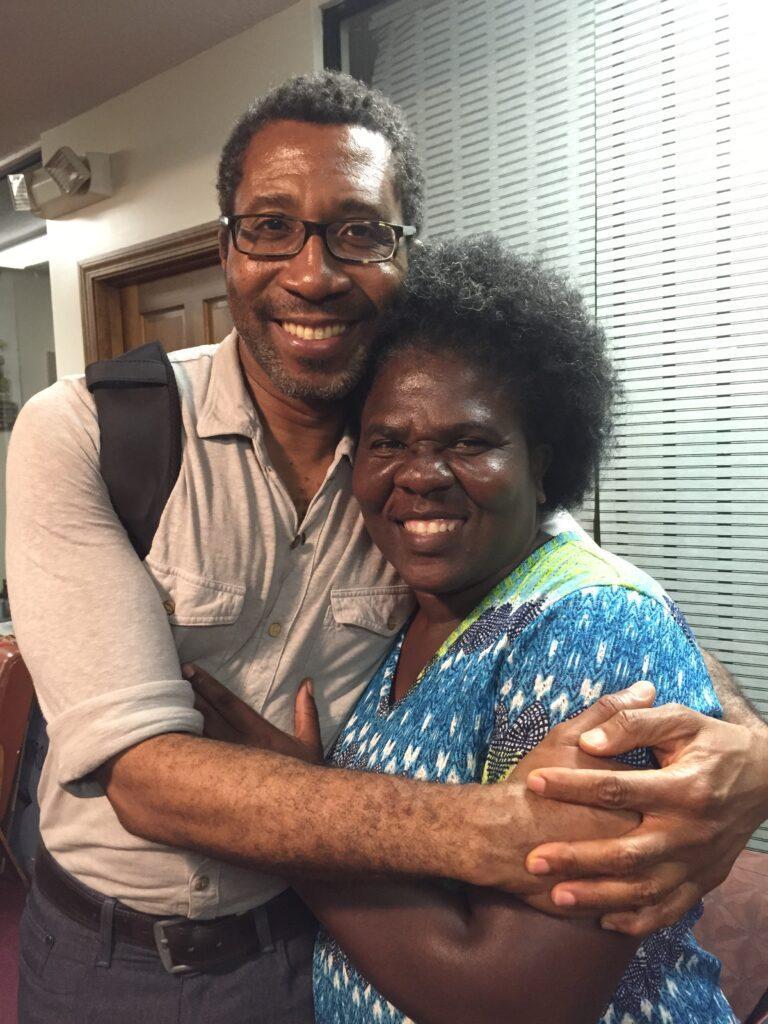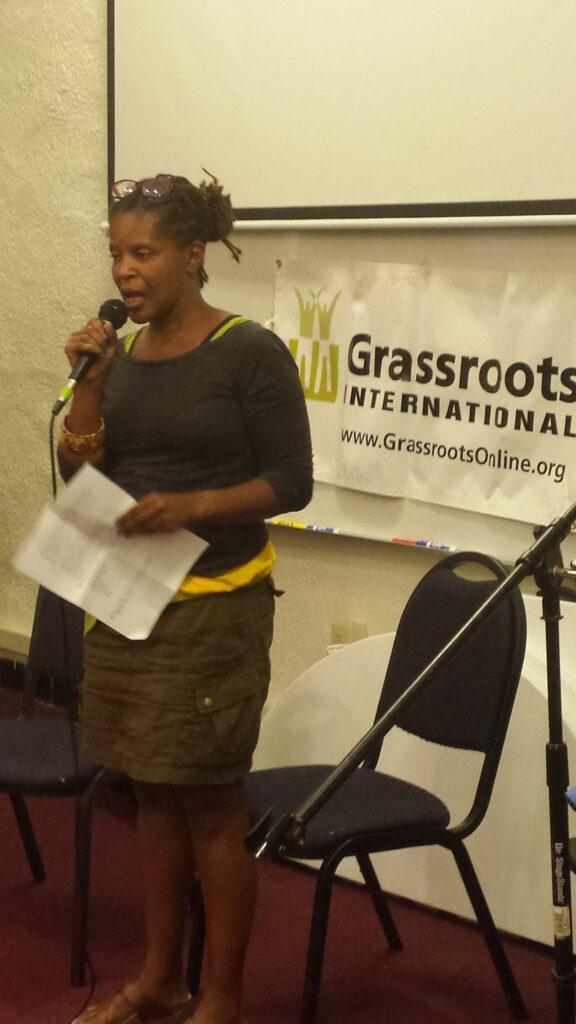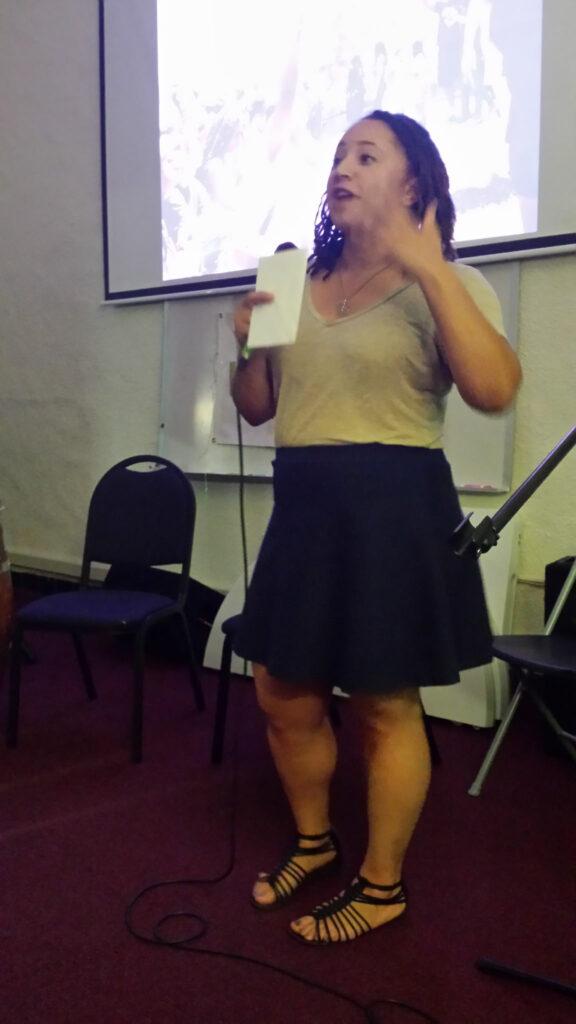Black Lives & Climate Justice: From Haiti to New Orleans to Boston
Scores of people—showing a great diversity of races, ages and backgrounds—packed into the room to look together at the connections between climate justice and Black Lives Matter, and how these movements present themselves in the experiences of Haiti, New Orleans and elsewhere. More people spilled out into the hallway, illustrating how ready people were to hear the powerful words coming from inside: everyone matters and has a role in the struggle for human rights and the survival of the planet.
The community event coordinated by Grassroots International featured Juslene Tyresias of Haiti’s Peasant Movement of Papaye (MPP). Juslene was joined by community activist Trina Jackson, who spoke about the Movement for Black Lives Convening, and speakers from the Dominican Development Center, Alternatives for Community and Environment, and Intelligent Mischief.
From Haiti to New Orleans
Prior to arriving in Boston, Juslene commemorated the 10th anniversary of Hurricane Katrina in New Orleans as part of events organized by the Our Power Campaign. She joined Grassroots International supporters, community organizations and interested individuals for an evening called Black Lives and Climate Justice: From Haiti to New Orleans to Boston.

Juslene opened the evening with a mística—a grounding ceremony that comes out of the peasant movements in Latin America. In this mística, Juslene brought candles to represent light, fruit and water to represent nourishment, a book to represent knowledge, and flags from various social movements—including MPP, La Vía Campesina, the Our Power Campaign, Grassroots International, and the World March of Women—to represent solidarity. Holding up a flag for all to see she said, «These things on the floor are not here for decoration. In the struggle to change society each one of them has its place in the struggle; each piece can help us accomplish the changes we want.»
Participating in the 10 year commemoration of Hurricane Katrina was an eye-opening experience for Juslene. Describing her feelings coming out of New Orleans she said, “There were many things that moved me and I was surprised to learn. I could never understand nor could I ever imagine that within the US—this big rich power—that 10 years after Katrina there are some Americans living still without a home. It is the same situation as in Haiti five years after the earthquake.”
She was also surprised to learn that even in Boston there are children who go to school hungry. «This shows me how badly distributed the world’s wealth is,» said Juslene. «It increases my determination to fight to bring social justice.»
Juslene joined the MPP 12 years ago, after many years of being active in a youth movement in Haiti. She told us that when the MPP was founded 40 years ago, there was a lot of resistance to having women participate; husbands didn’t want their wives or girlfriends to get involved. She sees this as is one of the consequences of our current society which creates an oppressive relationship between men and women and brings sexism into all areas of life—in the workplace, at church, in the family, and even within our organizations. Challenging this has been one of the big victories in strengthening the MPP.
«We went from having 15 women in the MPP to 20,000 women today,» Juslene told us. «Within the MPP membership there are now women who are agronomists, civil engineers, and accountants. And today women make up the leadership of the MPP.»
Climate change is affecting all aspects of life in Haiti and the MPP’s work. According to Juslene, it has rained less than a dozen times this year in Haiti and temperatures are higher than ever. Water levels are low so there’s not enough water for cattle or food production. Eighty percent of Haiti’s agriculture is dependent on rainfall and because of the lack of rain Haiti will have to import more food than ever before. This has dire consequences when you consider that the main source of income for many peasants comes from cattle and growing food.
That being said, the MPP is at the forefront of building alternatives that will make a real difference for people in Haiti. As Juslene explained, “We plant a lot of trees. We conserve water in the soil. We build cisterns and wells so that people can have water.” The MPP has planted more than 30 million trees over the past 40 years. Not only that, but the MPP also has a solar panel production facility. Their work in agroforestry and renewable energy is a true remarkable.

Juslene drew connections between Haiti’s struggles, its history, and the current movement in the US of Black Lives Matter and Black liberation. “Haiti was the first Black republic to become independent. For that to happen, there were many values that were necessary. First, there was solidarity within the Black community. We created a language that our white masters could not understand. Other things we used were culture, music, food, dress. Remember, those values are still here, and to fight and struggle we have to use them. We used music that motivated us when we were losing hope… We must have unity, we must use solidarity, and we must use our cultural activities so that we can win our rights. Everything is possible if we want it.”
Black Lives Matter
Trina Jackson talked about the Movement for Black Lives Convening in Cleveland, Ohio which she participated in this summer. This was a gathering of over 1,500 black people from all over the country and beyond, coming together to strengthen and deepen the movement for black liberation. Trina gave a vibrant description of the convening, sharing with us the tone and spirit of the gathering.
One thing that was really central was this idea of Black love. It wasn’t just about coming together in anger and outrage and pain. That definitely was present, and we’re all feeling it as Black people (and our allies), but it was also about Black love. And it wasn’t just words. It was a call to action in terms of how we were together in the space. How we supported each other in the space when we were telling our stories, how we were listening. How we came from a place of love, even when we were disagreeing with each other about our perspective and our experiences with the issues. Black love was a huge theme—and that that is a strategy for organizing, love-based organizing. What does it mean to stand for love, in addition to knowing what we’re against and what we’re trying to dismantle?
Trina noted that there were no famous leaders or celebrities at the convening, but instead it was made up of «people who are directly impacted on the ground facilitating a lot of the plenaries, leading a lot of the workshops. It was a very widely distributed flat leadership—people locally taking action and organizing under the banner of Black Lives Matter, which includes a range of issues.»
The range of issues brought up at the convening included LGBT rights (in particular respect and inclusion of trans-people), Black immigrants, and the inclusion of all marginalized peoples within the Black community.
«We have to continue to dialogue with the most marginalized within Black communities. We have to make sure that Black Lives Matter is about Black people. Not Black votes, not Black consumers, not Black dollars, not Black police officers, not Black politicians, but Black people’s lives. That’s what I feel is really important and that is our opportunity,» Trina told us.
Making the Local Connections

Bringing the local perspective to the event, Kalila Barnett, Director of Alternatives for Community and the Environment (ACE), talked about the context here in Boston and the work currently happening around climate justice. The issue of climate justice is linked to transportation privatization, housing, education. She noted that, «The struggles and the ways that people are able to recover or not recover are so linked to the systems of oppression that we are fighting and that we face on a regular basis.»
Kalila said that following the energy coming out of the 2014 Climate March in New York City, people are thinking about how to continue to have a public active voice, especially going into the COP 21 climate talks which will be happening in Paris in December 2015. “We don’t want just any solution, we don’t want just any deal. We want a good deal. We want a deal that actually benefits our communities – that sets the stage for a different kind of economy.”
A few more highlights from the event:
- Terry Marshall of Intelligent Mischief told us about the satirical book project The Black Body Survival Guide. This book, soon to be released, is meant to be survival guide for “owners of Black Bodies,” providing satirical tips such as to “walk around with your hands up all the time,” and to “have every possible form of ID with you at all times.”
- Magalis Troncoso, Director of the Dominican Development Center, spoke up in solidarity with Dominicans of Haitian-descent facing threat of deportation in the Dominican Republic. “We face a lot of discrimination and as immigrants we internalize the oppression. When we talk about the relationship between Haiti and the Dominican Republic, it’s really sad for us that here we are organizing to promote immigrant justice and at the same time we see that in our own country this discrimination is happening. This is something we do not tolerate.”
In closing, Juslene gave us a call to action: «We need everyone to participate in the struggle – whatever your nationality, whatever the color of your skin, whatever your social class—so that we can change this crisis into a more just society of solidarity and dignity. We invite all of you to participate however you can—with your knowledge, your words, your culture, your money, your thoughts, your heart—so that this world can become a place where we can all live.»

